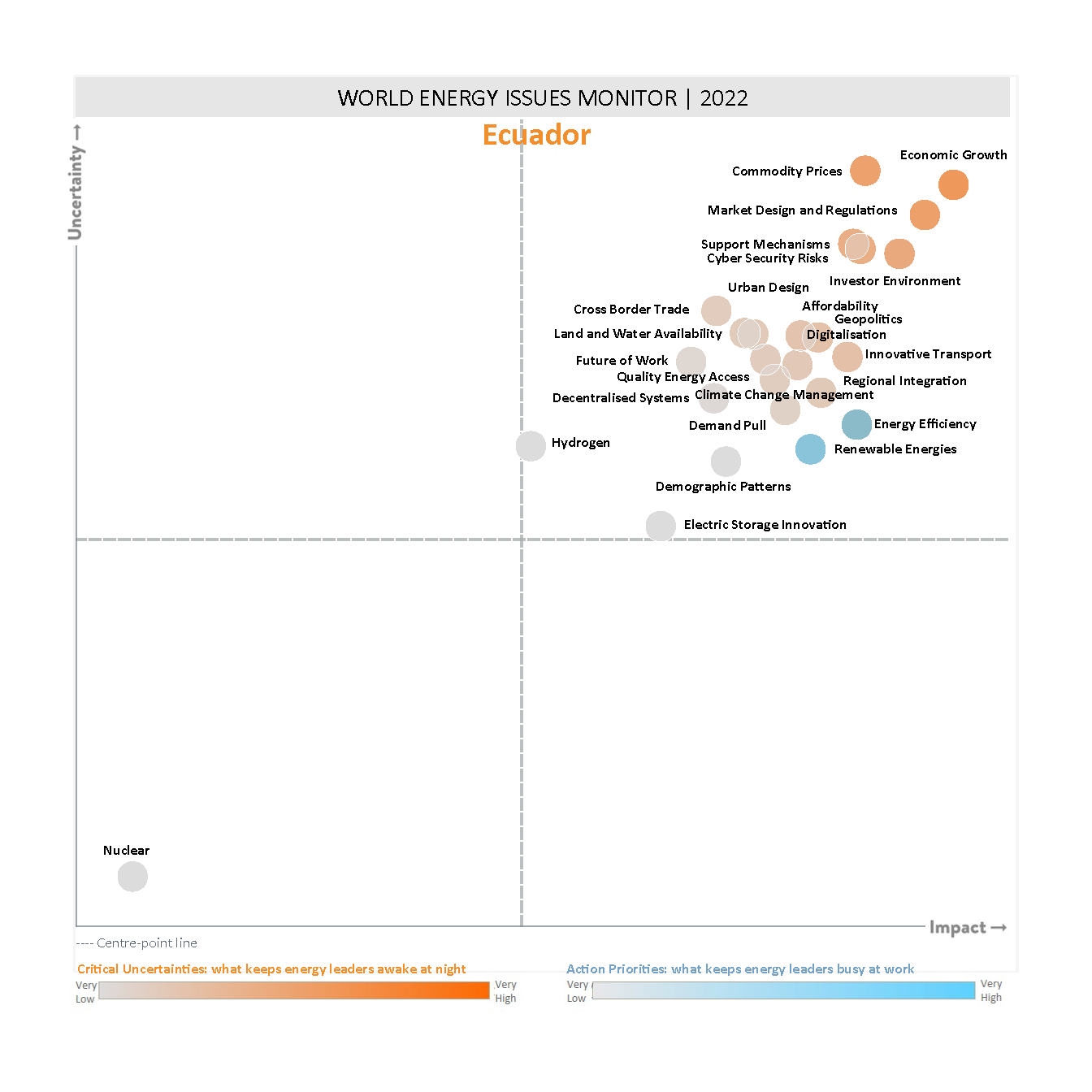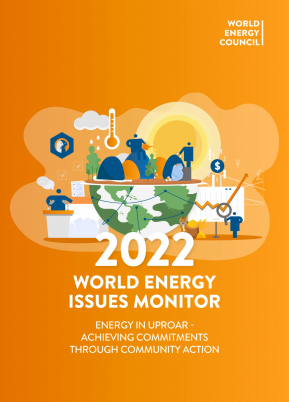The Ecuadorian National Committee aims to promote sustainable energy development in Ecuador, as a part of the World Energy Council’s energy vision. As a member of the World Energy Council network, the organisation is committed to representing the Ecuadorian perspective within national, regional and global energy debates. The committee includes a variety of members to ensure that the diverse energy interests of Ecuador are appropriately represented. Members of the committee are invited to attend high-level events, participate in energy-focused study groups, contribute to technical research and be a part of the global energy dialogue.
Energy in Ecuador

2021 was marked by the fight against the COVID-19 pandemic, which was supported by the massive vaccination plan led by the new national government. This strategy also steered the reactivation of the energy sector. From the middle of the year, Ecuador’s post-pandemic energy production and consumption patterns began to change, reaching a national peak consumption of 4208 MW on December 8th, 2021. On the other hand, the oil sector also faced a positive incentive due to the growth of the oil prices.
These aspects, together with the novel energy policies launched by the government both in electricity, oil, and mining issues, suggest a promising energy scenario for 2022 and the next four years. This favorable energy scenario is based on the design of a more robust Investor Environment that allows ensuring the Ecuadorian Economic Growth and the creation of jobs, based on novel and more competitive Market Design and Regulations which consider Energy Efficiency strategies, including a smart public lightning initiative, an industry modernization plan, the promotion of electric vehicles and the modernization of public transportation. Promoting Renewable Energies is also part of this strategy, which also considers other emerging technologies, such as the implementation of a smart microgrid or the design of Electric Storage applications based on battery energy storage systems BESS and even green hydrogen, in the medium-term future.
The 2021 issues lay the baseline for what is expected in 2022 and the next four years. The energy post-pandemic scenario together with the implementation of the mentioned energy policies state a promising perspective for the energy sector. In 2021, three important Public Selection Processes (PSP) took place to make viable the construction of a large solar power plant (200 MW), a moderately sized wind power plant (110 MW), and a smart microgrid to be implemented in Galápagos Islands capable of handling 14.8 MWp of photovoltaic generation together with 40.9 MWh of BESS. These projects represent the beginning of a sustainable initiative towards the implementation of green generation from private investors based on renewables, which have the aim of supporting Ecuador’s decarbonization goals. In this way, a new PSP has been launched for development in 2022, implementing 500 MW of Renewables, considering small hydroelectric plants, photovoltaic generation, and wind farms.
As Ecuador’s economy is dependent on oil production, the last year rise in its price will have a beneficial impact for the country’s economy in 2022, but, at the same time, will cause a hit to citizenship due to the fuel prices adjustment, compounded by the government´s decision to reduce subsidies. In this sense, an important strategy for increasing the oil production in Ecuador is also being implemented. Moreover, the energy policies are also to make transparent Commodity Prices, both for fuel and electricity. The aim is to state the actual costs of the commodities and to better focus the social subsidies for ensuring equitable access to energy.
Other private investments have also been promoted by novel Regulations. The aim is to place a new framework for complementary market initiatives to promote private generation and other emerging technology such as energy storage, while ensuring the execution of territory development projects that consider the diversity of Ecuadorian Demographic Patterns and their necessities.
Another important issue for 2022 is the Regional Integration since it will facilitate energy exchange with neighboring countries and improve the electricity service. For this purpose, the Andean Regional Electricity Market will begin its operation, based also in the modern monitoring and control technology. In this context, the implementation of a comprehensive digitalization platform in all the energy sector is crucial, considering the inherent Cyber Security Risks and their proper countermeasures. Finally, a plan for “universal access to energy” has been designed to reach 100% of electricity access in 2030 (from the current 97%).
TESTING PERSPECTIVES WITH THE WEC ECUADOR MEMBER COMMUNITY
Based on the Latin America and the Caribbean region’s main critical issues discussed during a digital session in February 2022, Ecuador will mainly tackle the following:
1. Public-private balance
One of the key uncertainties for Ecuador’s energy sector is the 2022 Economic Growth. This issue has a particular interest since the post-pandemic period requires several strategies to reactivate the economy, while creating new jobs. In this connection, it is crucial to promote a better private investment environment that helps the economy to be reactivated. During several years, Ecuador’s energy sector was composed mainly by public utilities; however, there is the necessity of pursuing a balance between public and private investment in the energy sector. The new policies have been conceived for achieving this important challenge.
2. Innovation and implementation of emerging technology
Promoting a diversified energy mix is part of the energy transition initiative. In this connection, the Ecuadorian energy policies are oriented to “open for business” in the energy sector. Therefore, the Ministry of Energy and Nonrenewable Natural Resources has launched several PSPs towards the implementation of emerging technology both for Renewable Generation and for flexible transmission. This includes small hydroelectric plants, photovoltaic generation, wind farms, a transmission corridor for improving the energy efficiency of oil facilities, and energy storage and digital transformation.
3. Regulation and innovation alignment
Structuring new regulations constitutes one fundamental aspect for ensuring the accomplishment of the energy policies, including the private investment and the implementation of emerging technologies. In this regard, the proper alignment between the policy making, the innovation incentive and the regulation proposal is crucial. Thus, the Agency of Regulation and Control of Energy and Nonrenewable Natural Resources is working together with the Ministry to ensure a modernization capable of handling the new challenges oriented to achieve a comprehensive upgrade of the entire Ecuadorian energy sector.
Acknowledgements
Ecuador Member Committee
Jaime Cepeda
Downloads

Ecuador Energy Issues Monitor 2022
Download PDF
World Energy Issues Monitor 2022
Download PDF




_368_520_s_c1_c_c.png)





